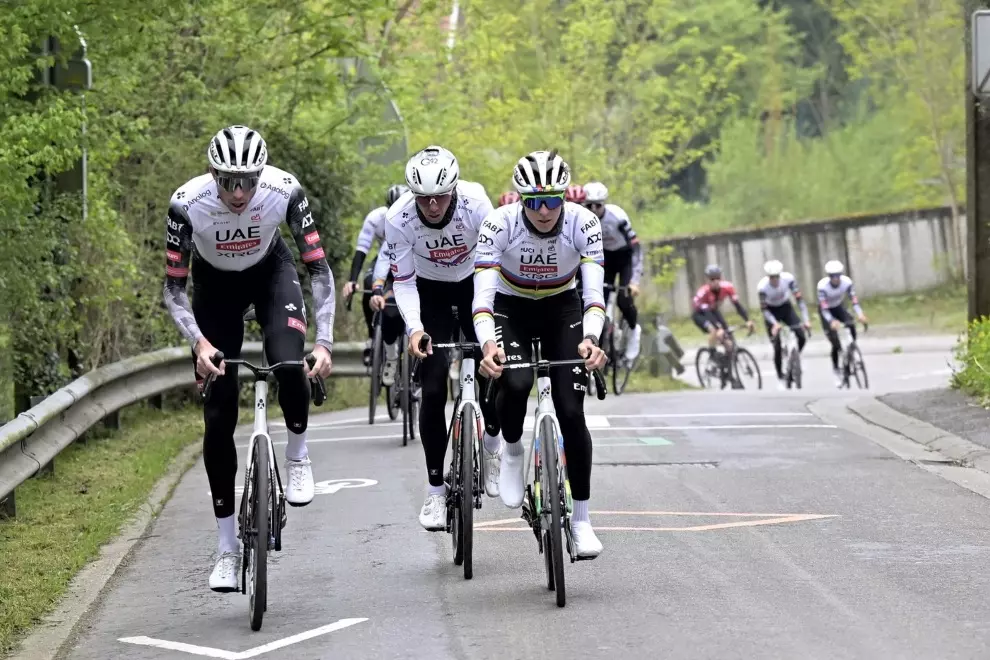As proof of that, only one cyclist has ever won the race five times, the great Eddy Merckx. In addition, three riders have won the last five editions of the Liège-Bastogne-Liège, and they are the cream of this generation of cyclists: Tadej Pogačar (UAE Team Emirates–XRG) and Remco Evenepoel (Soudal Quick-Step) have won it twice, and Primož Roglič (Red Bull–BORA–hansgrohe, but then Jumbo-Visma) won in 2020.
Evenepoel and Pogačar will be on the starting line in Liège on Sunday again, and it should make for a cracking race. Oddly, the two have never raced against each other in the Liège before. Both riders did start the 2023 edition, but the Slovenian crashed out of the race as he was going for a rare Ardennes Classics grand slam, having won both the Amstel Gold Race and La Flèche Wallonne in the week leading up to the race. Evenepoel won that race, as he had won the 2022 edition, with a long solo ride, taking off halfway up the redoubtable Côte de la Redoute (1.6 km at 9.5 %) and winning by a margin of 1:06 over Tom Pidcock (then of INEOS Grenadiers).

With Pogačar in the race and hopefully remaining on his bike, the double Olympic champion won’t be able to ride alone to the finish line this year – and he and the Slovenian world champion may not have the race all to themselves. Pidcock is back again and, as the leader of the second-level team Q36.5, he has become a stronger and more mature rider than he was two years ago. And Lidl-Trek’s Mattias Skjelmose, who beat both Pogačar and Evenepoel in the Amstel Gold Race this year, is still slated to ride, despite having crashed out of Wednesday’s La Flèche Wallonne and appearing to injure his leg and elbow.
Whether they ride away from the bunch or are accompanied by a small, select group, the key to the race is likely to be the final climb in the 257.2 km race, up the steep slopes of the Côte de la Roche aux Faucons (1.3 km at a daunting average grade of 11%, with ramps of more than 15%). It comes with about 20 km left to ride in the race and would appear to be the ideal spot for Pogačar to try to drop any riders still on his wheels, the way he did on the imposing Mur de Huy (1.3 km @ 9.6%, with ramps of up to 19%) in La Flèche Wallonne.
No one was able to stay within shouting distance of him on that climb, with Pidcock finishing third, 12 seconds behind, and Evenepoel coming ninth, at 16 seconds. But the finish line on Wednesday was atop the Mur; on Sunday, there will be another 20 km left to ride. Assuming that Pogačar drops Evenepoel, Pidcock and perhaps another rider or two on the Côte de la Roche aux Faucons, a small group of top riders could work together and bring the Slovenian back over 20 km.
In any case, there are three difficult climbs in the last 40 km, the Côte de la Redoute, the Côte des Forges (1.3 km @ 7.2%) and the Côte de la Roche aux Faucons. At some point in that stretch of mountainous road, the endgame will kick off.
Pogačar looked very tired at the finish of La Flèche Wallonne, as that had been his sixth hard Classics race since March 8 and his fourth in 17 days. Will three rest days be enough for him to recover his full strength? I’m not sure. He rode a similarly full schedule in 2023, and I have always believed that his crash in that year’s Liège was largely due to fatigue.
If Evenepoel and Pidcock, say, come off the Côte de la Roche aux Faucons trailing a tired Pogačar by 10 or 12 seconds, they have a good chance to catch him. (But if it’s 30 or 40 seconds, they can forget it.) If Evenepoel and Pogačar come to that climb together, with a chase group 30 seconds behind, the world champion should win. Though he has looked very good since his return from injury, Evenepoel is not yet at full strength and is not, and may never be, his rival’s equal as a climber. On the other hand, the Belgian is fresher and gaining in strength with every race.
Whoever wins, it is sure to be a humdinger of a race. And the weather, which had such an impact on Wednesday, is currently forecast to be sunny and pleasant with a high of 19°C. So there won’t be any excuses for the losers.




